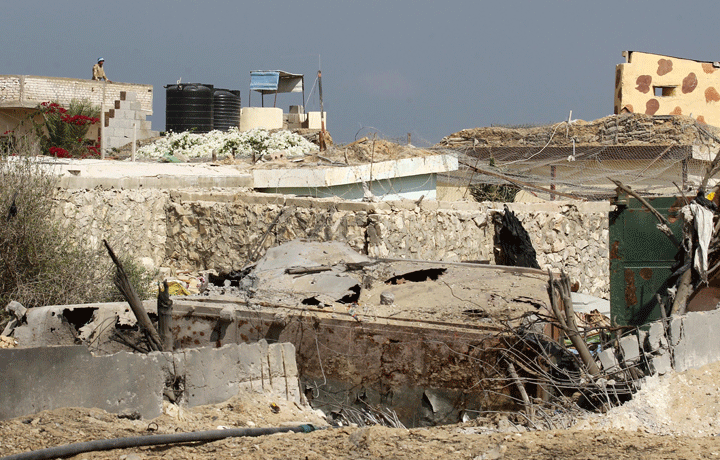CAIRO, Egypt – Egyptian mediators raced Wednesday to pin down a long-term cease-fire between Israel and Hamas to prevent more fighting in the Gaza war, as Hamas said it agreed to extend a temporary truce that was set to expire at midnight.

Azzam al-Ahmad, the head of the Palestinian delegation, said late Wednesday the cease-fire was meant to ensure a “positive atmosphere,” while noting there had been “lots of progress” in the talks. Al-Ahmad said Hamas has agreed to extend the cease-fire for another five days, though a senior Hamas official earlier said the truce had been extended for 72 hours.
The two sides were considering an Egyptian proposal that partially addresses their demands, but deep differences have kept the deal in doubt. Two hours before the cease-fire’s end, Israeli police said a rocket landed in southern Israel, though it hit an open area and caused no damage.
Hamas denied responsibility for the attack.
There was no immediate comment from Israeli officials.
READ MORE: With cease-fire deadline looming, Egypt proposes plan aimed at ending war in Gaza
During the temporary cease-fire, Israel halted military operations in the war-battered coastal territory and Gaza militants stopped firing rockets, save for the one late Wednesday.
Earlier, a Hamas official said more time was needed to secure a longer-term deal to halt the fighting.
The official said there remained disagreements over amendments to the Egyptian proposal requested by Hamas. The Islamic militant group wants to clarify phrasing on certain points, including reconstruction efforts for Gaza and the movement of individuals and goods, said the official, who spoke on condition of anonymity because he was not authorized to discuss the talks with journalists.
A spokesman for Israel’s prime minister declined to comment.
A cease-fire extension would grant both sides additional time to negotiate a more sustainable truce and a roadmap for the coastal territory.
READ MORE: Hamas says Gaza war not over until demands met
Hamas is seeking an end to a crippling blockade imposed by Israel and Egypt in 2007. The blockade has greatly limited the movement of Palestinians in and out of the territory of 1.8 million people. It has also restricted the flow of goods into Gaza and blocked virtually all exports.
Israel says the closure is necessary to prevent arms smuggling, and officials are reluctant to make any concessions that would allow Hamas to declare victory.
Israel wants Hamas to disarm, or at least be prevented from re-arming. Hamas has recovered from previous rounds of violence with Israel, including a major three-week ground operation in January 2009 and another weeklong air offensive in 2012. It now controls an arsenal of thousands of rockets, some with long ranges and powerful. Gaza militants fired more than 3,000 rockets toward Israel during the war.
Neither side is likely to see all of its demands met, but the Egyptian proposal tabled Tuesday offered some solutions. A member of the Palestinian delegation at the Cairo talks said the proposal calls for easing parts of the Israeli blockade of Gaza, bringing some relief to the territory.
The proposal leaves the key areas of disagreement, including Hamas’ demand for a full lifting of the blockade and Israeli calls for Hamas to disarm, to later negotiations.
The Palestinian negotiator said he had some reservations about the proposal and would try to improve it.
“We would like to see more cross-border freedom, and also to have the question of a Gaza seaport and airport discussed,” he said.
The Palestinian official spoke on condition of anonymity because he was not authorized to discuss negotiations with journalists.
As the talks continued, Hamas indicated it was sticking to its demands.
In recorded remarks broadcast on Hamas radio Wednesday, Ismail Haniyeh, the top Hamas leader in Gaza, said that “achieving a permanent truce can come only through lifting the blockade on Gaza.”
Israel, meanwhile, signalled it was ready to respond to renewed fire from Gaza following the end of the cease-fire.
“We will continue to defend, continue to operate.”
“We will be ready for any effort, any way, at any time,” Israel’s chief of staff, Lt. Gen. Benny Gantz, told reporters.
Amid the cease-fire, an Associated Press video journalist and a freelance Palestinian translator working with him were killed Wednesday when ordnance left over from the war exploded as they reported on the conflict’s aftermath.
Simone Camilli, a 35-year-old Italian, and Ali Shehda Abu Afash, 36, died when an unexploded missile believed to have been dropped in an Israeli airstrike blew up as Gaza police engineers worked to neutralize it in the northern Gaza town of Beit Lahiya. Four police engineers also were killed. Three people, including AP photographer Hatem Moussa, were badly wounded.
The war began on July 8 with Israel’s air campaign against Gaza’s Hamas rulers, whom Israel blamed for the kidnapping and murder in June of three Israeli teenagers in the West Bank. Nine days later, Israel sent in ground troops to destroy Hamas’ underground cross-border tunnels constructed for attacks inside Israel.
The fighting has so far killed more than 1,900 Palestinians, the majority of them civilians, Palestinian and UN officials say. On the Israeli side, 67 people have died, all but three of them soldiers.

Comments